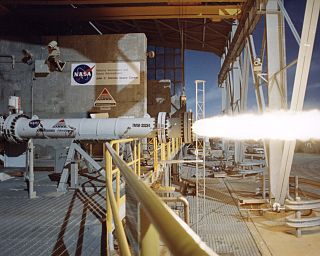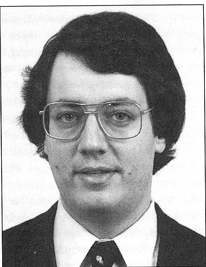Starstruck Inc. was a company cofounded by James Bennett and Phil Salin that attempted to perform low-cost orbital rocket launches using experimental, sea-launched hybrid rockets. [1] While a commercial failure, it is an important part of hybrid rocket history, [2] responsible for restarting commercial development of hybrid rockets. [3] [4] One of its core leadership was former first Apple CEO Michael Scott. It was based in Redwood City, California. [5] [1]
The company folded after three rockets were built and one was successfully launched to suborbital space. Several veterans of Starstruck founded the American Rocket Company (AMROC), [6] which also eventually failed. AMROC's intellectual property was acquired by SpaceDev.[ citation needed ]
Phil Salin ... a cofounder of StarStruck, uses this thought experiment to drive home a main point: A dramatic reduction in the cost of getting there is the key to developing space for human use.

A hybrid-propellant rocket is a rocket with a rocket motor that uses rocket propellants in two different phases: one solid and the other either gas or liquid. The hybrid rocket concept can be traced back to the early 1930s.

Spaceflight is an application of astronautics to fly objects, usually spacecraft, into or through outer space, either with or without humans on board. Most spaceflight is uncrewed and conducted mainly with spacecraft such as satellites in orbit around Earth, but also includes space probes for flights beyond Earth orbit. Such spaceflight operate either by telerobotic or autonomous control. The more complex human spaceflight has been pursued soon after the first orbital satellites and has reached the Moon and permanent human presence in space around Earth, particularly with the use of space stations. Human spaceflight programs include the Soyuz, Shenzhou, the past Apollo Moon landing and the Space Shuttle programs. Other current spaceflight are conducted to the International Space Station and to China's Tiangong Space Station.

SpaceShipOne is an experimental air-launched rocket-powered aircraft with sub-orbital spaceflight capability at speeds of up to 3,000 ft/s (2,000 mph) / 910 m/s (3,300 km/h) using a hybrid rocket motor. The design features a unique "feathering" atmospheric reentry system where the rear half of the wing and the twin tail booms folds 70 degrees upward along a hinge running the length of the wing; this increases drag while retaining stability. SpaceShipOne completed the first crewed private spaceflight in 2004. That same year, it won the US$10 million Ansari X Prize and was immediately retired from active service. Its mother ship was named "White Knight". Both craft were developed and flown by Mojave Aerospace Ventures, which was a joint venture between Paul Allen and Scaled Composites, Burt Rutan's aviation company. Allen provided the funding of approximately US$25 million.

The Space Age is a period encompassing the activities related to the space race, space exploration, space technology, and the cultural developments influenced by these events, beginning with the launch of Sputnik 1 on October 4, 1957, and continuing to the present.

Sea Launch was a multinational—Norway, Russia, Ukraine, United States—spacecraft launch company founded in 1995 that provided orbital launch services from 1999 to 2014. The company used a mobile maritime launch platform for equatorial launches of commercial payloads on specialized Zenit-3SL rockets from a former mobile/floating oil drilling rig renamed Odyssey.

SpaceDev, a part of the "Space Systems Business" of Sierra Nevada Corporation, is prominent for its spaceflight and microsatellite work. It designed and built components for the hybrid rocket motors for Paul Allen's Tier One suborbital SpaceShipOne space program operated by Scaled Composites. It is also developing micro- and nano-satellites, a small expendable launch vehicle, the SpaceDev Streaker, and has designed a piloted suborbital and orbital spaceship of its own, the SpaceDev Dream Chaser, in collaboration with NASA.
James (Jim) Charles Bennett is an American businessman, with a background in technology companies and consultancy, and a writer on technology and international affairs from a conservative point of view.

The Office of Commercial Space Transportation is the branch of the United States Federal Aviation Administration (FAA) that approves any commercial rocket launch operations — that is, any launches that are not classified as model, amateur, or "by and for the government" — in the case of a U.S. launch operator and/or a launch from the U.S.

James William Benson was an American aerospace entrepreneur who founded SpaceDev, a commercial satellite and satellite component development company, and the Benson Space Company, a civilian spaceflight venture focused on commercial space tourism.

This is a timeline of first orbital launches by country. While a number of countries, incl. Canada, Australia, Germany, Brazil, Algeria, Kazakhstan, Turkey, Argentina, Italy, Malaysia, Poland, South Africa, the Philippines, Egypt, Spain, Mexico, Thailand and Chile, have built or launched satellites, as of 2022, eleven countries, incl. the United States, Japan, India, China, Iran, Israel, France, the United Kingdom and South Korea, have had the capability to send objects into orbit with their own launch vehicles. Russia and Ukraine inherited the capability of the space launchers and satellites from the Soviet Union, following its dissolution in 1991. Russia launches its rockets from its own and foreign (Kazakh) spaceports.

Space advertising is the practice of advertising in space. This is usually done using product placement during crewed space missions.
Starstruck may refer to:

Founded in 1985 by George A. Koopman, Bevin McKinney and Jim Bennett, veterans of Starstruck Inc., the American Rocket Company, or AMROC, was a California-based company that developed hybrid rocket motors.
The Conestoga was a launch vehicle design funded by Space Services Inc. of America (SSIA) of Houston, Texas. Conestoga originally consisted of surplus LGM-30 Minuteman stages with additional strap-on boosters, as required for larger payloads. It was the world's first privately funded commercial rocket, but was launched only three times between 1981 and 1995, before the program was shut down.

Phillip Kenneth Salin (1950–1991) was an American economist and futurist, best known for his contributions to theories about the development of cyberspace and as a proponent of private (non-governmental) space exploration and development.
Space launch market competition is the manifestation of market forces in the launch service provider business. In particular it is the trend of competitive dynamics among payload transport capabilities at diverse prices having a greater influence on launch purchasing than the traditional political considerations of country of manufacture or the national entity using, regulating or licensing the launch service.

Gilmour Space Technologies is a venture-funded Australian space company headquartered in Queensland, Australia that is developing hybrid-engine rockets and associated technology to support the development of a low-cost space launch vehicle.

BluShift Aerospace is an employee-owned American aerospace firm based in Brunswick, Maine. Targeting the growing smallsat and cubesat launch markets, bluShift is developing suborbital sounding rockets and small-lift orbital rockets which will be launched from a proposed new spaceport in Maine. The company has received primary funding from NASAs SBIR grant program, the National Science Foundations I-Corps grant program, the Maine Technology Institute, and the Maine Space Grant Consortium. The company has active operations at the former Brunswick Naval Air Station and Loring Air Force Base.

Equatorial Space Systems PTE LTD. also known as Equatorial Space, is a Singapore-based company that develops hybrid-engine rockets and space launch services. The company was founded by Simon Gwozdz and Praveen Ganapathi Perumal in 2017 in Singapore, with the goal to develop low-cost, safe and eco-friendly space launch vehicles.